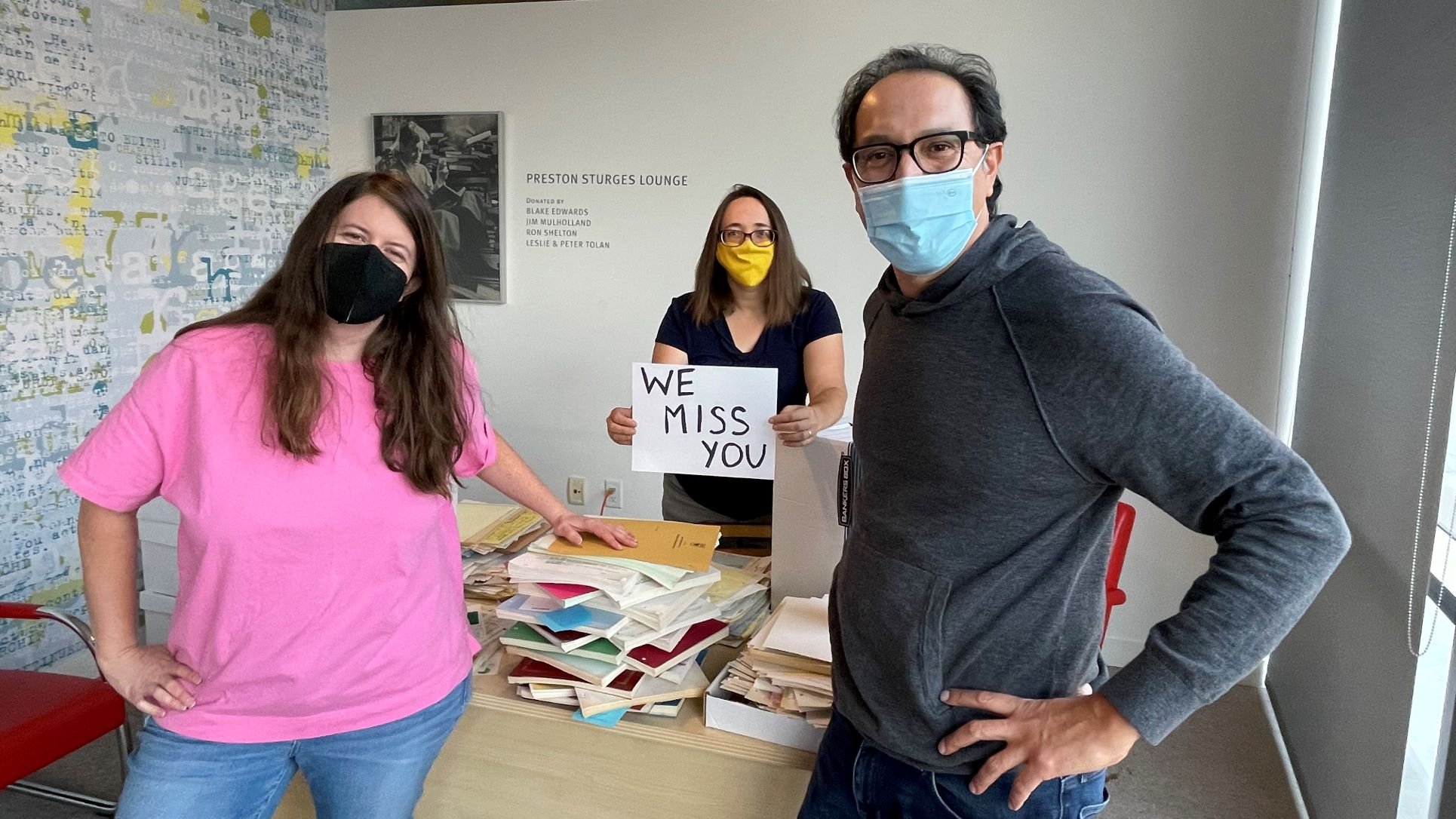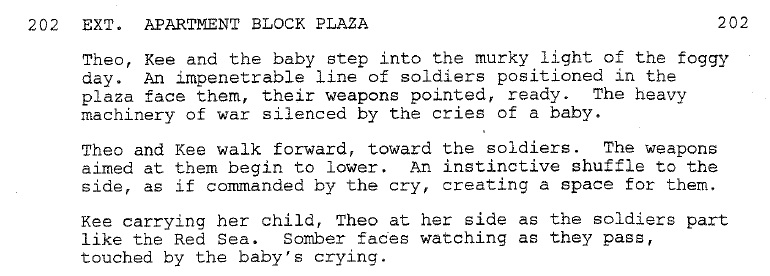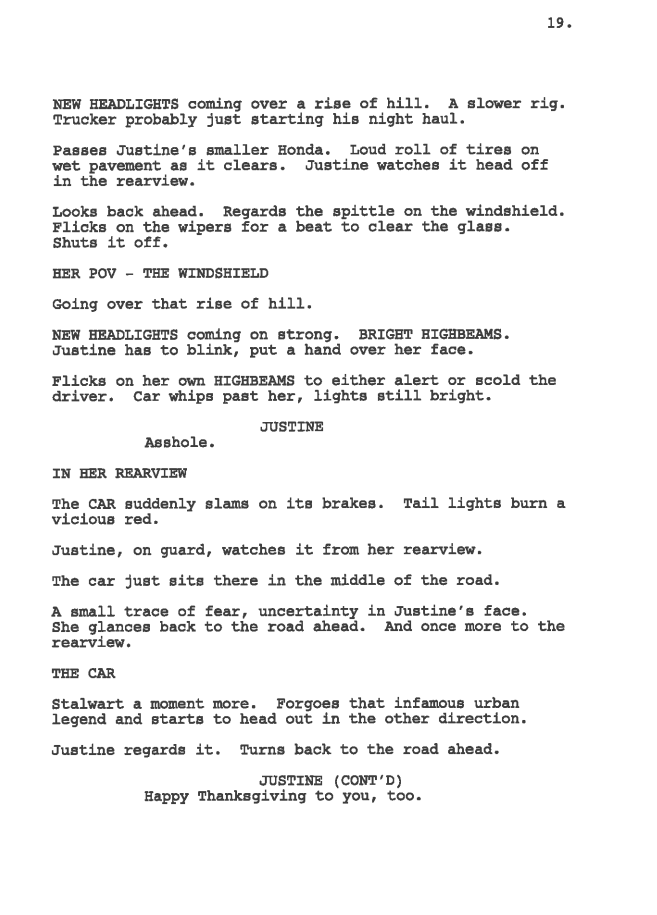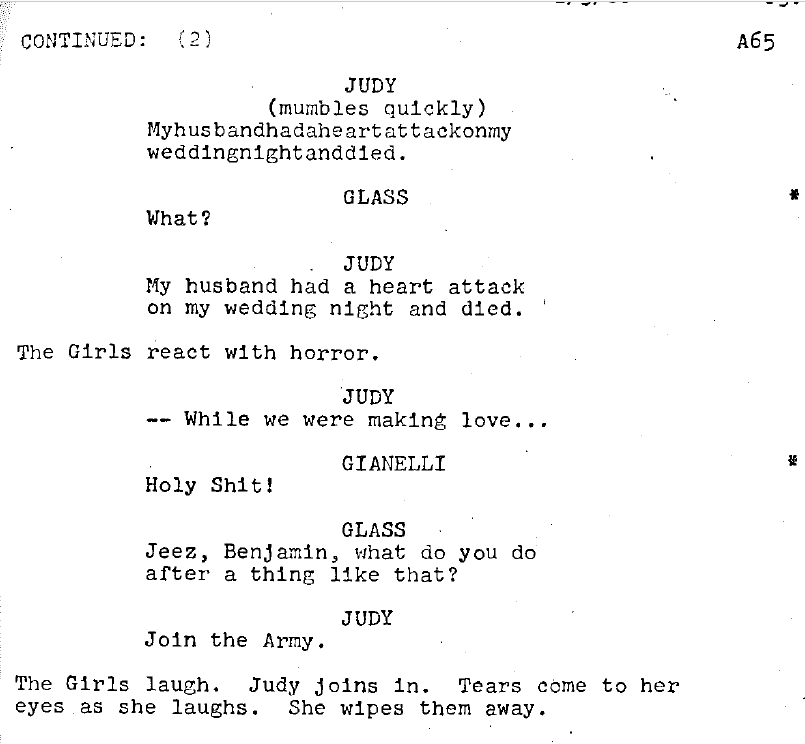Doesn’t a nice, cold cocktail sound like a perfect end to a productive afternoon writing and reading inspiring scripts in the WGF Library? Here are our picks for bars and restaurants with delicious happy hours, all within walking distance of the WGF Library.
Study Break: Things To Do Around The WGF Library
It may be a surprise that the library is conveniently located by a plethora of places to visit, things to do, and foods to eat. So when you book an appointment to read Everything Everywhere All at Once or every episode ever made of Breaking Bad (which would take many, many appointments), count on visiting some of our neighbors!
WGF LIBRARY STAFF'S SCREENPLAY PICKS
Seasons Greetings! It’s Hilary, Javier and Lauren, the librarians/archivists at the Writers Guild Foundation. We miss you! We especially miss recommending scripts to you when you come to visit the library. With the release of the WGAW and WGAE’s 101 Greatest Screenplays of the 21st Century… So Far, we’ve been talking a lot about feature screenplays and felt like sharing our Staff Picks.
Yes, we’re still closed to in-person visitors for the time being, but hopefully that will change in the future. In the meantime, check out each of our personal recommendations below and know that we are still available to help even though our doors are closed. E-mail us at library@wgfoundation.org with questions or check out one of our bi-weekly Library Live sessions. If you’re looking to read scripts on our lists or the WGA’s new 101 list, we advise checking out some of our favorite sites like scriptslug.com and simplyscripts.com.
If you’re ever trying to find a script online, a good search tactic is this:
“Title of film” + “screenplay” or “script” + “pdf”
So that looks like:
Sound of Metal screenplay pdf
Of course, not every title is out there, but you can often find a lot using this simple trick. As soon as we know when we’ll re-open, you’ll find an announcement and lots of pertinent information in our newsletter and likely on Twitter.
**Also, just know we went back to the 20th Century for some of our picks…. We’re librarians/archivists and like to include a wide swath of time periods.
HILARY’S PICKS
1.) THE APARTMENT (1960)
Written by Billy Wilder & I.A.L. Diamond
Fran and Bud feel so real in their witty and sad and cautiously optimistic ways.
2.) BACK TO THE FUTURE (1985)
Written by Robert Zemeckis & Bob Gale
It’s a great twist on time travel, making it less about science and more human, fun and relatable.
3.) BUTCH CASSIDY AND THE SUNDANCE KID (1969)
Written by William Goldman
I don’t often care about criminals, but I care about these criminals whose friendship and trust for one another matters more than anything.
4.) CHILDREN OF MEN (2006)
Screenplay by Alfonso Cuaron & Timothy J. Sexton and David Arata and Mark Fergus & Hawk Ostby, Based on the novel “The Children Of Men” by P. D. James
The world is bleak and sadly prescient but wins us over with hope.
5.) DESK SET (1957)
Screenplay by Phoebe Ephron & Henry Ephron, Based on the play by William Marchant
I love it because it’s about librarians! And the ideas of both fearing and revering technology still ring true.
6.) GROUNDHOG DAY (1993)
Written by Danny Rubin and Harold Ramis, Story by Danny Rubin
We all wish we could go back and say something different. The writers gave us this chance in a hilarious and heartwarming way.
7.) HAROLD AND MAUDE (1971)
Written by Colin Higgins
I appreciate the bittersweet character arc of Harold and that it’s an unconventional romance that doesn’t end happily ever after.
8.) MEAN GIRLS (2004)
Screenplay by Tina Fey, Based on the book “Queen Bees and Wannabes” by Rosalind Wiseman
As a former teenage girl, I loved the unexpected sympathy I developed for Regina and the Plastics.
9.) MOONLIGHT (2016)
Screenplay by Barry Jenkins, Story by Tarell Alvin McCraney
The script feels like poetry.
10.) TITANIC (1997)
Written by James Cameron
I love historical fiction and details are important to me and Cameron delivered.
JAVIER’S PICKS
1.) Drive (2011)
Written by Hossein Amini, Based on a book by James Sallis
Rich with character, amazing prose and dialogue, and a great character arc. At 121 pages, the script is a little long and the prose a bit wordy, but you’ll still turn the pages until the very end.
2.) Halloween (1978)
Written by John Carpenter and Deborah Hill
My friend and film enthusiast calls this film a “horror machine”. At 98 pages and minimalistic prose, the script feels contemporary, not to mention the tension literally drips off the page.
3.) The Island (2005)
Screenplay by Caspian Tredwell-Owen and Alex Kurtzman & Roberto Orci
Amazing world-building. At 138 pages, it’s definitely too long, but the page count seems fitting for such an epic story.
4.) Kristy (2014)
Written by Anthony Jaswinki
Not just another slasher film script. Kristy really ramps up the terror after the below page.
5.) Nightcrawler (2014)
Written by Tony Gilroy
Unique protagonist, and no scene headings at all.
6.) Ordinary People (1980)
Screenplay by Alvin Sargent, From the novel by Judith Guest
The below page may not read like a traditional climax, where the hero defeats the villain, but in fact, it’s the perfect “dramatic” example of that kind of climax.
7.) Passengers (2016)
Written by John Spaihts
Like Nightcrawler, it also doesn’t have scene headings, except at the very start and the very end. Amazing love story.
8.) Salt (2010)
Written by Kurt Wimmer
It feels like a staircase going up, up, up, with the stakes literally rising every 10 pages.
9.) Snow White and the Huntsman (2012)
Screenplay by Evan Daugherty and John Lee Hancock and Hossein Amini
Epic story that is written so tightly, it all fits in 110 pages. Great study for how to really get in and out of scenes quickly.
10.) The Terminator (1984)
Written by James Cameron and Gale Anne Hurd
Cameron doesn’t write words, he paints pictures.
LAUREN’S PICKS
1.) Adam’s Rib (1949)
Written by Ruth Gordon & Garson Kanin
Chemistry between characters can be written. This script proves it.
2.) Bend It Like Beckham (2003)
Written by Gurinder Chadha and Paul Mayeda Berges and Guljit Bindra
This script is worth the read for how every single character has warmth and nuance, which I think is really a hallmark of great writing. And it's just so much fun.
3.) Boyz n the Hood (1991)
Written by John Singleton
This script is a blueprint for a movie, but it also feels like a great work of literature, which I think should be aspirational for any writer.
4.) Cabaret (1972)
Screenplay by Jay Presson Allen
Based on the plays “Cabaret” by Joe Masteroff and “I Am a Camera” by John Van Druten and on the short story “Berlin Stories” by Christopher Isherwood
Movies based on stage musicals are tough. It's just a hard medium to adapt, but Cabaret feels like the gold standard—and I think Jay Presson Allen deserves some credit in shaping how the musical numbers in the Kit Kat Klub serve as commentary on the story.
5.) Enough Said (2013)
Written by Nicole Holofcener
I love Nicole Holofcener's writing—and I LOVE that Albert (played in the movie by James Gandolfini) is a TV archivist.
6.) La Bamba (1987)
Written by Luis Valdez
One of my favorite film genres is the musical biopic. If you're trying to write one, La Bamba is a must-read.
7.) Milk (2005)
Written by Dustin Lance Black
I think Dustin Lance Black does such a beautiful job really unlocking Harvey Milk’s compassion. I’m really galvanized and inspired by this script.
8.) Norma Rae (1979)
Screenplay by Irving Ravetch and Harriet Frank Jr.
This is my favorite script and I wish it were mentioned more in conversations about great scripts. You should read it.
9.) Private Benjamin (1980)
Written by Nancy Meyers & Charles Shyer & Harvey Miller
I re-watched this movie during quarantine and then re-read it and I think it's basically perfect. Also, I wanted to include at least one script with an expository scene where the characters sit around a fire and just talk....
10.) Short Term 12 (2013)
Written by Destin Daniel Cretton
It's hard to think of a script that more completely envelopes you in its setting, characters and real emotions than Short Term 12... and it does so subtly and quietly. I love writing that makes me cry.
10 TIPS FOR FELLOWSHIP APPLICATIONS
Fellowship season is an exciting time at the WGF Library.
Every year, we make it a goal to set up Q&A sessions with many of the major talent development programs and fellowships, so that you — writers — can make connections and get clarification on the application process.
Perhaps you’ve been able to attend one of our recent virtual Library Live sessions with guests from the WarnerMedia Access Writers Program, Universal Writers Program, Humanitas New Voices Program, National Hispanic Media Coalition TV Writers Program, Warner Brothers Television Workshop or our own WGF Veterans Writing Project…
In case you’ve missed any of these sessions, we wanted to share some of the insights and inspiration we’ve gleaned recently.
After all, our goal is always to help you get the materials and info you need to put together an unforgettable application with jaw-dropping writing samples. Here are 10 things to consider as you embark on your quest to attain a coveted spot in a fellowship or writing program.
1.) KNOW THYSELF
Obviously, this is good life advice, but it’s especially true if you’re applying to a writing program. Know yourself as a writer. Know where your talents lie. Know what kind of material you write. Know what types of stories you are interested in developing. Know what writing TV (or features) entails. Know that you are meant for this job (writing) more than any other job. Fellowships are a stepping stone.… not a school. The programs are interested in promising writers they can mold and send off into the professional world. As an applicant, make their job easy. Know yourself as a writer.
2.) A FELLOWSHIP IS BUT ONE POINT OF ENTRY
Most of the popular writing programs get one to two thousand applicants vying for a number of slots in the single digits.
Have other wheels turning and other paths forged as you apply for fellowships. Join a writers group, take classes, go to networking events, take a related job in the field and tell everyone you know that you want to be a TV (or features) writer. These can all be initial entry points into the profession.
Bet on a few different horses, put eggs in a few different baskets…. If you have several different balls in the air, you’re less likely to be devastated and derailed if you don’t get into a writing program.
3.) ACCEPT REJECTION
You will get rejected. It’s just a fact. You heard us just say there are thousands of applicants vying for a handful of slots.
Don’t let rejection be a deterrent. Not getting accepted into a program in a given year DOES NOT MEAN YOU ARE A BAD WRITER WHO IS UNWORTHY OF A PROSPEROUS CAREER. It just means that all of this is a marathon, not a sprint. We’ve heard from every single program that it’s exceedingly rare for a writer to get in on the first try. It can take 4 or more tries… and sometimes not even then.
Remember that it takes a long time to get better and better — and sometimes it takes a few tries for a program to really see your abilities and potential.
Most of the programs keep tabs on people who apply multiple times. Your growth counts. Learn to accept rejection as part of the process and keep applying.
4.) USE THE APPLICATION DEADLINES
Use them to hold yourself accountable, finish your samples, and ensure your professional documents are ready to send out. Even if you don’t get the fellowship, now you have some great samples on hand.
If you want to write television professionally, you’ll be expected to churn out solid scripts in very little time — sometimes as little as a few days.
Use the application process to get into the swing of writing well AND writing quickly.
5.) HAVE ANOTHER SAMPLE
Nearly every fellowship manager, coordinator or participant we’ve spoken to has expressed that emerging writers should have TWO amazing samples in their portfolio. In addition to being killer scripts, these samples should showcase beyond a shadow of a doubt your specific skills as a writer.
Are you good with jokes? Do you write characters with nuance and warmth? Do you have specific cultural or experiential expertise? Do you tell stories about sports? Superheroes? Your samples should speak to your specific skillset.
Many writing programs ask for two samples right up front. Even if they don’t ask for two, it’s good to have a second… and, if you can, even a third sample ready. You never know WHO, HOW or WHEN somebody might ask, “What else do you have?”
6.) GRAB ‘EM BY THE THROAT
Hooking a reader in the first few pages of your sample(s) is a must. Did we mention that many of the major writing programs receive applications numbering in the thousands?
A sample of your writing is NOT the time to make a reader wait many pages to see your brilliance. If the character twist or series hook or most emotional moment comes toward the end, you’ve lost your first advocate — your reader — and you need them on your side from the outset.
Hook them in the first few pages to let them know they are in capable hands.
7.) TAKE A RISK
We’ve heard countless program administrators say that many writers play it safe — that if an applicant submits a spec of an existing show, it might look and feel like the show, but the episode content is…. safe (i.e. standard or forgettable).
Your specs and especially your original content is the place to make A SPLASH!!
Don’t stray from your wheelhouse as a writer, but TAKE A RISK. Sure, you might fail and get rejected, but you just might make an impression for saying something brave or asking a hard question in your story or covering familiar territory in a dynamic way.
Prove you know how to write for TV, but share a fresh perspective. Prove how well you know the screenwriting rules by breaking one or two.
8.) KNOW FORMATTING BUT KNOW FORMATTING ISN’T EVERYTHING
Especially if you’re spec-ing an existing series, it’s great to exhibit your knowledge of the show’s nuts, bolts and mechanics, but make sure you’re not obsessing over formatting at the expense of something more important, such as telling a captivating story and ensuring the characters’ voices and behavior ring true.
Elly Lachman of the Warner Brothers Television Writers’ Workshop explained that readers are familiar with the show you’re spec-ing, but they’re not comparing your spec to a script from the show.
You’re applying to a writing program, not a formatting one. Put your emphasis on the right thing.
9.) WRITE FROM THE HEART
If you write about things you care about, you’re that much closer to unleashing your distinct voice, which is arguably your greatest asset as a budding writer as well as the most vital thing to showcase in any film/TV writing application or sample.
Odds are, if you really care about what you’re writing about… you can get someone else to care about it too.
Write for yourself.
10.) KEEP WRITING!!
The thing that makes you a writer is that you WRITE. Make time to do it every day. Keep doing it in spite of rejection. The more you write, the better you get. As high as you think your innate talent level is now, it can only improve the more time you spend writing (and also reading and studying shows and movies).
Honing your taste helps you develop your voice.
One of our favorite anecdotes to come out of our recent Q&A series comes from Emerlynn Lampitoc of the Universal Writers Program. One of Emerylnn’s favorite bits of inspiration?
The muse can find you at any time, but it better find you working.
So get to work.
We’ll have more guests in the future to continue the conversation. In the meantime, keep writing and applying to all the great programs out there. If you have questions for the WGF Librarians, you can reach us at library@wgfoundation.org!











